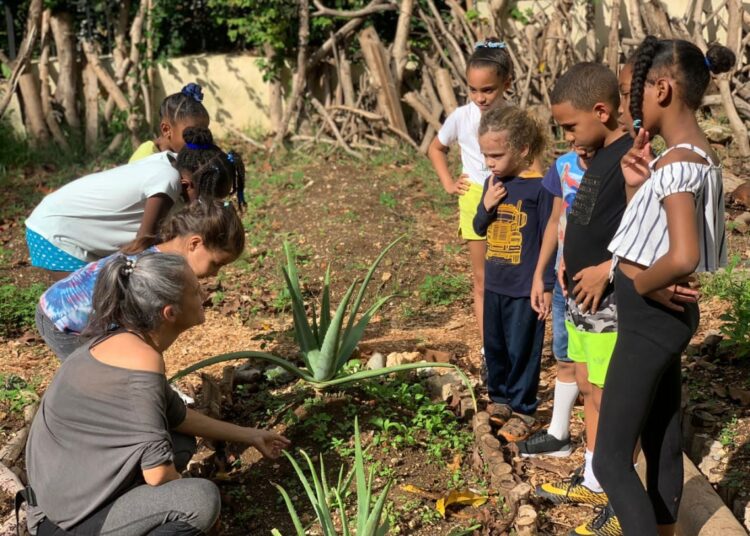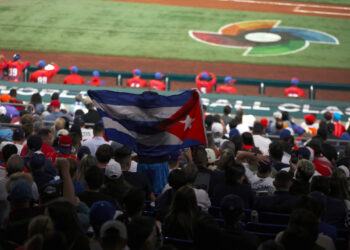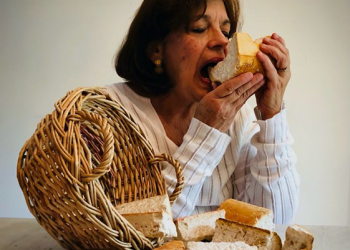In the flowerbeds at the end of 420 Sol Street in Old Havana, Sandra Sotolongo and her students have planted much more than coffee, lemon grass, oregano and passion fruit seedlings. There, a vision of environmental, community and transformative education is germinating among the children and young people who come to visit. This space, known as the Ecological Classroom, is part of the local development project inSurGENTES, an initiative that since 2015 has articulated pedagogical, ecological and feminist proposals with a strong community commitment.
An accountant by training, a popular educator by vocation and an activist with a deep environmental and gender sensitivity, Sandra has pursued a unique professional career in fields as diverse as economics, culture, education and social and environmental management. Her work, along with that of Alex Nistal, her partner and co-director of inSurGENTES, was recognized in 2024 by the territorial delegation of the Ministry of Science, Technology and Environment (CITMA) in Havana.
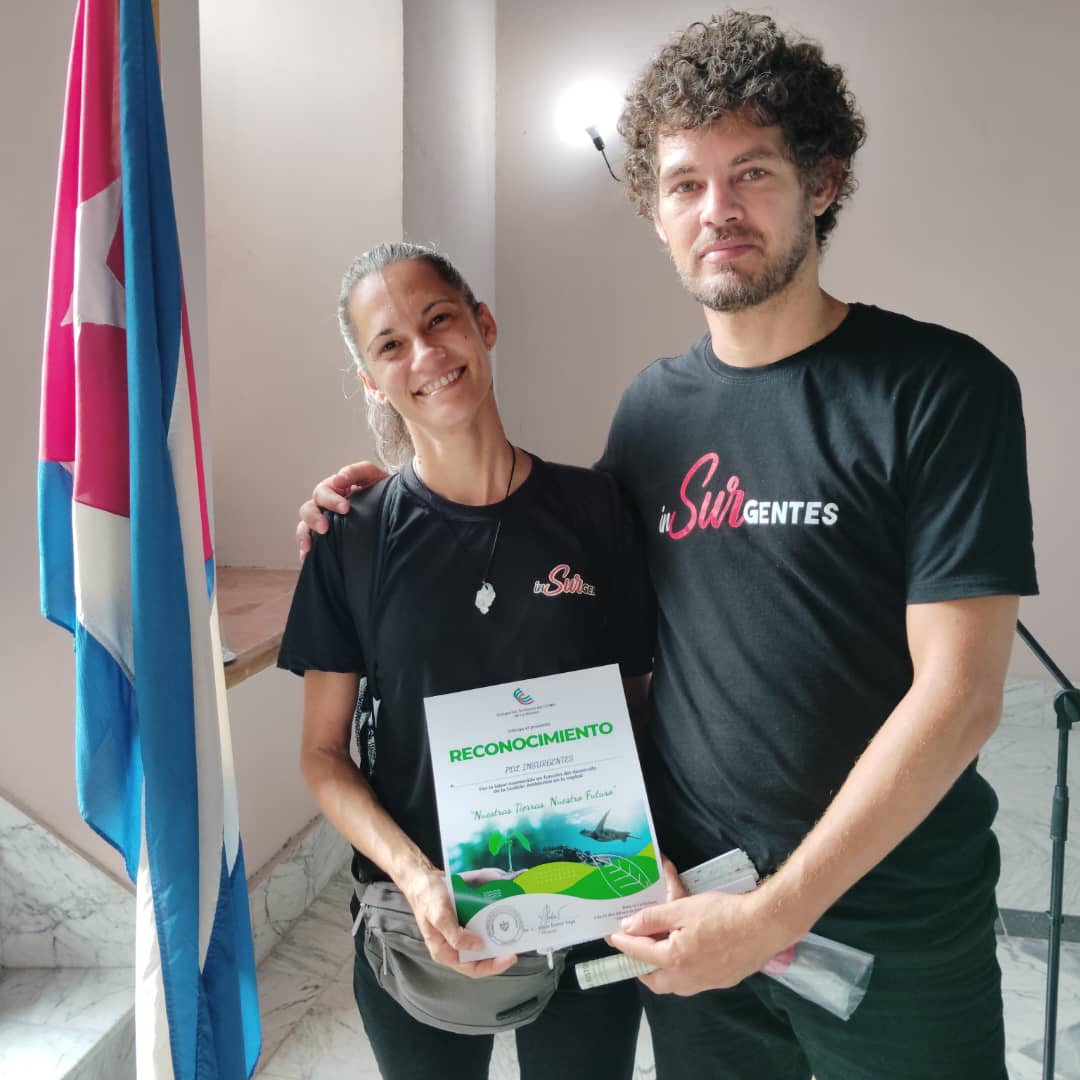
A mother of three, for almost a decade she has poured a good part of her vital energy into inSurGENTES, a project that, although rooted in Old Havana, seeks to branch out through its seeds. She has dedicated the last few years to this initiative, combining her experience in public institutions, NGOs, and community groups with actions and lines of work that link alternative education, children’s yoga, and Montessori pedagogy.
At inSurGENTES, Sandra coordinates other key programs such as the Feminisms and Masculinities Program and a line of economic sustainability based on artisanal carpentry: they produce bicycles, toys, and other wooden products. She also leads the Jardín de Cuba, a space focused on the development of multiple intelligences and the implementation of the Montessori method.
Amid the complexities of the current Cuban context, inSurGENTES — driven by Sandra’s tenacity and pedagogical commitment — aims to achieve economic sustainability without abandoning her principles or her purpose of sowing the future in community.
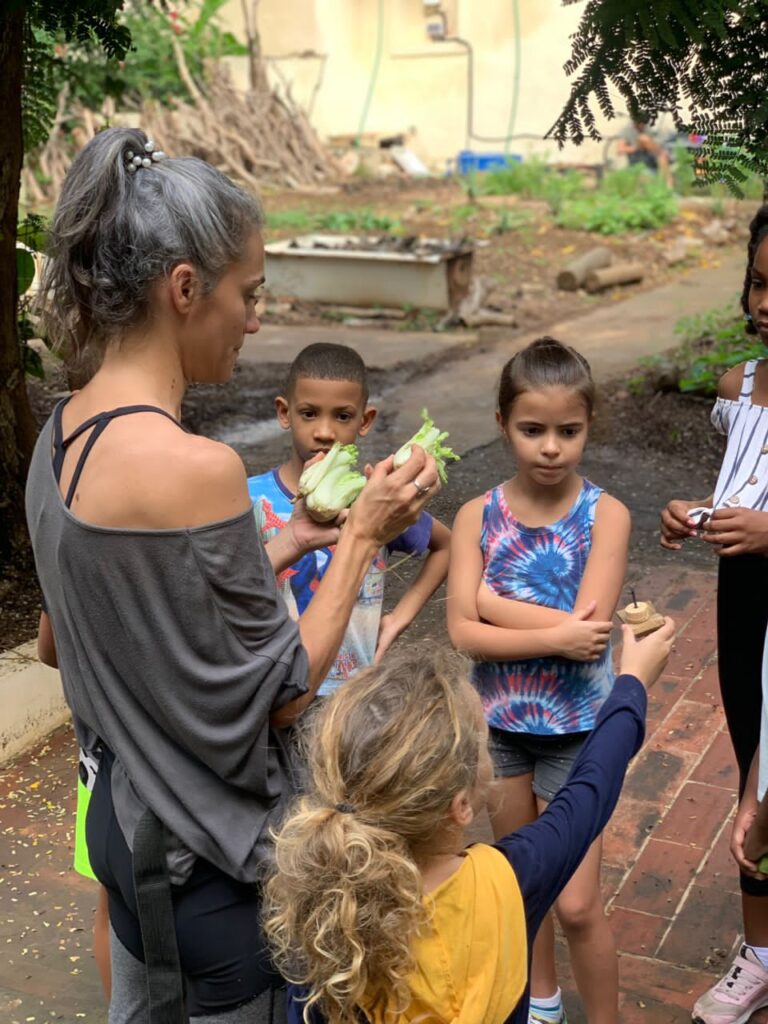
Where does the project’s name come from?
It’s a combination of words: “in,” the people within; “sur” (south) and “gente” (people). We refer to the people of the global south, with their burden of vulnerability and struggle. It also has a sense of insurgency, because we seek to break down separations: between city and countryside, between school and nature. We are committed to a different kind of education, based on a philosophy of life that is still rare in Cuba, such as Montessori or open-air learning.
When and how did the project emerge?
It’s the legacy of more than ten years of work. It began around 2010, with the Barrio Habana family project, which I led with Pável García, the father of my oldest children. We worked through sports — futsal — with a focus on community and the environment.
In 2015, we requested a government grant for an abandoned space near my house. We turned it into what is now the Ecological Classroom: an open-air garden where we grow, teach, and share with the community. It’s an oasis in the middle of the city. This is how our first green space was born, where we planted coffee and herbs, and built an open, intergenerational, and ecological educational vision that offers space for children, families, and the elderly.
What is the Ecological Classroom?
We gave it that name because we want to convey that a classroom doesn’t need walls: for us, contact with the earth is a legitimate learning space. During the pandemic, this place came to life even more: medicinal plants and vegetables — oregano, turmeric, spinach — were shared with the community. And the ties with other urban gardens were strengthened.
How did the transition to becoming a Local Development Project happen?
That change came with the pandemic. With the legal reforms that occurred in Cuba in the non-state sector, in 2022, I officially founded the Local Development Project (LDP) inSurGENTES, together with Alex Nistal. Legality allowed us to have a bank account, hire collaborators, and receive donations. But to sustain ourselves financially, we decided to create a production line: making wooden bicycles and toys. This part would fund the social work of the ecological classroom. Part of the profits (35%) is used to support our social and educational activities.
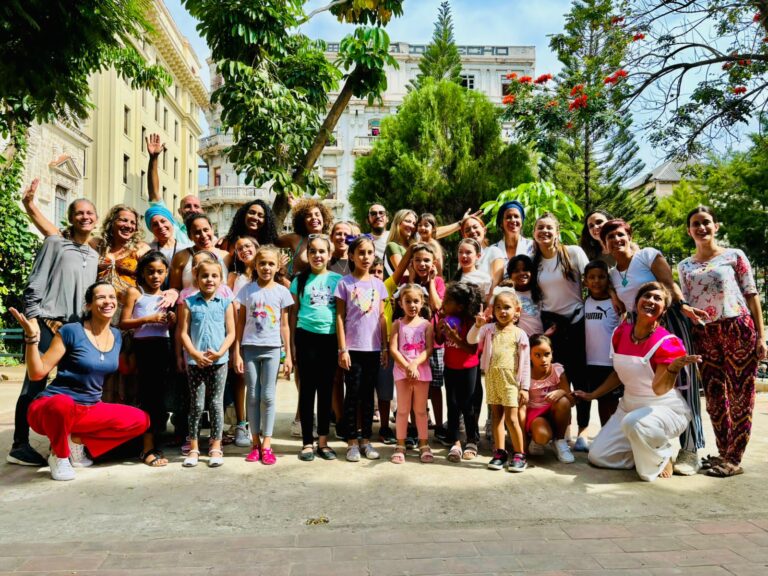
Did the experience of growing coffee also come about during this time?
Yes. During the pandemic lockdowns, we started growing coffee in the Ecological Classroom. Alex, a coffee fanatic, received some seedlings that someone gave him because they couldn’t take care of them anymore. They were very small. So he said, “What if we put them in the classroom, now that we have time to take care of them?” We were in the middle of quarantine, and we began this process like those doing research from scratch: trial and error. We were the first students in the classroom at the time.
We planted the coffee in the middle of the city. The walls of the space — three 15-meter walls — offered conditions similar to those of a mountain. Direct sunlight barely entered there, maybe two or three hours a day, just enough to avoid damaging the plant. We put mesh screens on it to filter the light, even played music… and we were successful. That’s how this story began. Today, we continue to grow it as part of the philosophy of self-sufficiency and respect for the land that we want to promote.
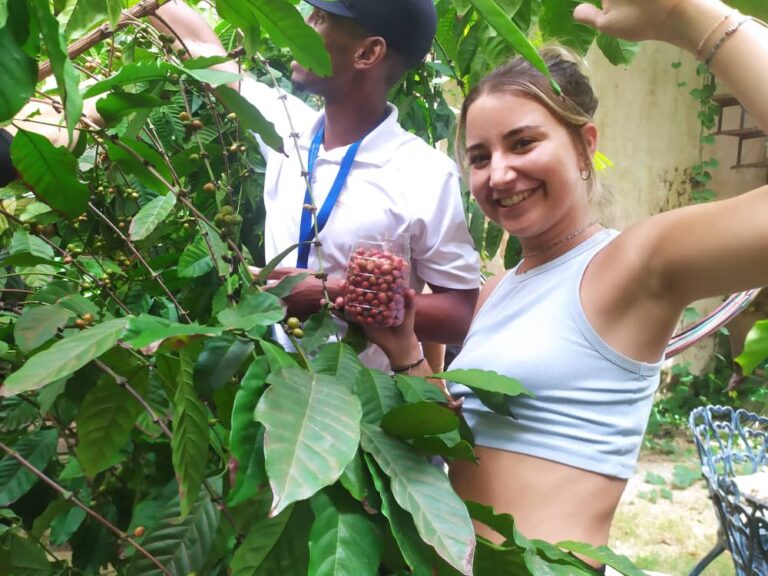
And the wooden bicycles?
The manufacture of wooden bicycles is not new in the world, but it is pioneering in Cuba. We approached it as a technical and ecological challenge. However, we faced many limitations: a lack of parts, difficulties importing, and legal obstacles. There are no domestic manufacturers of essential parts like brakes or pedals. We have made progress thanks to solidarity and donations, such as those we received from the Lazos project.
What other difficulties have you faced?
Many obstacles to import materials. Although the law allows it, the mechanisms are unclear: we need foreign currency; importers ask for minimum amounts of 3,000 or 5,000 USD, which we cannot cover. So we turned to solidarity: donation of parts, making one-off contributions… Only now, after much trial and error, have we managed to bring together all the necessary parts to assemble two wooden bicycle prototypes.
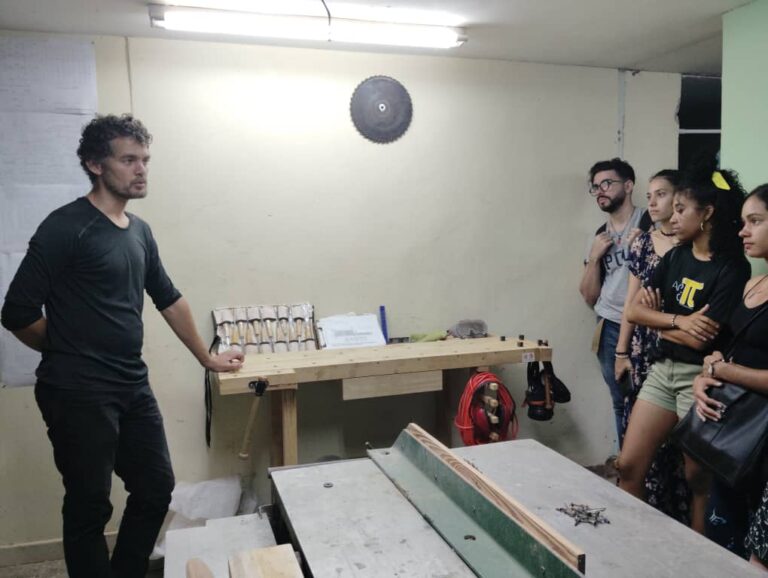
What is the scope of this economic line of the project, and how does it connect with the values of inSurGENTES?
The bicycles aren’t for mass sale. We want to use them in eco-tourism experiences: tours of the historic center, trips to nearby beaches, routes linked to diving and coastal cleaning. The dream is to manufacture a stock of ten bicycles to support these activities. But the challenge remains maintaining a balance between the economic and the community aspect: we have children, families, and schools that benefit from our spaces for free, while we pay taxes, salaries, and rent…
At the community level, what impact have you had as a LDP?
We focus on free educational activities, especially for vulnerable children and families. Schools often lack materials or staff, and our spaces serve as a complement. We promote a different kind of education, without authoritarianism, without adult-centrism. A philosophy inspired by Montessori, Paulo Freire, and respect for childhood and creativity.
We want children to see mistakes not as failure, but as part of learning. We want them to value collaboration over competition. These are the foundations for a more autonomous and creative country. With the Montessori pyramid — which we built out of wood — we want to show how a well-prepared environment can transform children’s relationship with knowledge.
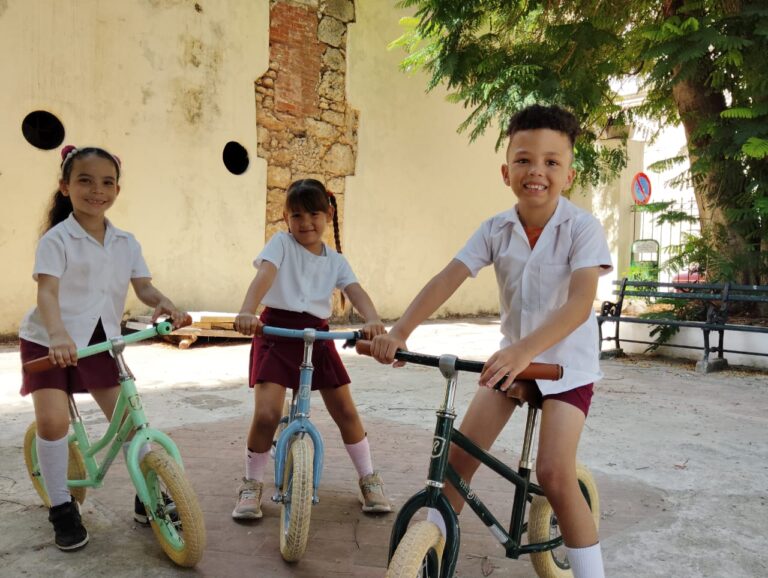
You mentioned other spaces that connect the surrounding community, such as the Jardín de Cuba.
Yes. In 2023, we opened the Jardín de Cuba, one block from Plaza Vieja. It’s a bigger challenge: keeping it clean, safe, and attractive. There, we want to integrate urban gardens, the Montessori method, art, and activities to enhance multiple intelligences in children. Thanks to cooperation and the Lazos project, we received solar panels, and since 2024, we have supplied almost 100% of our energy to the National Electric Power System (SEN).
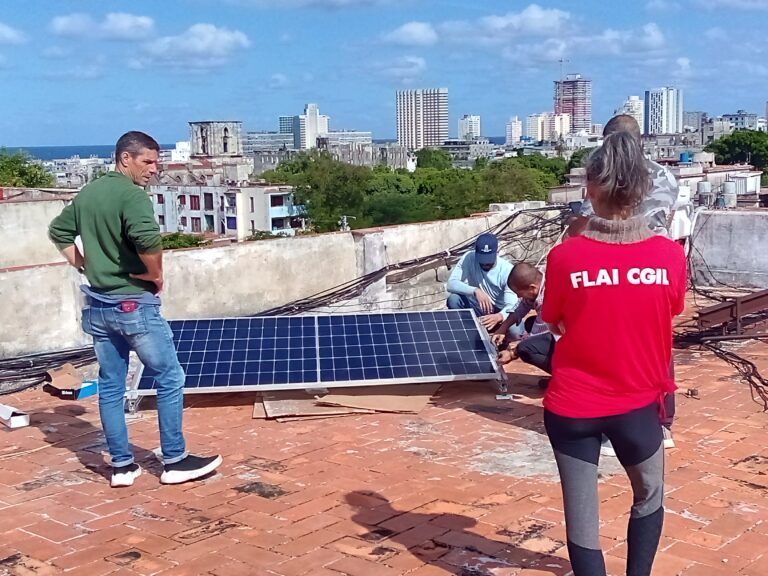
What are your dreams for the remainder of 2025?
Achieve economic sustainability without sacrificing social impact. We aim to enhance the Jardín de Cuba as an educational space by implementing a “Montessori pyramid” and open it to projects that foster multiple intelligences, demonstrating that error is not a failure but a learning path. That children grow up with creativity, cooperation, and ecological awareness.
________________________________________
If you’d like to support inSurGENTES’ community work, you can make your donation through this link.

